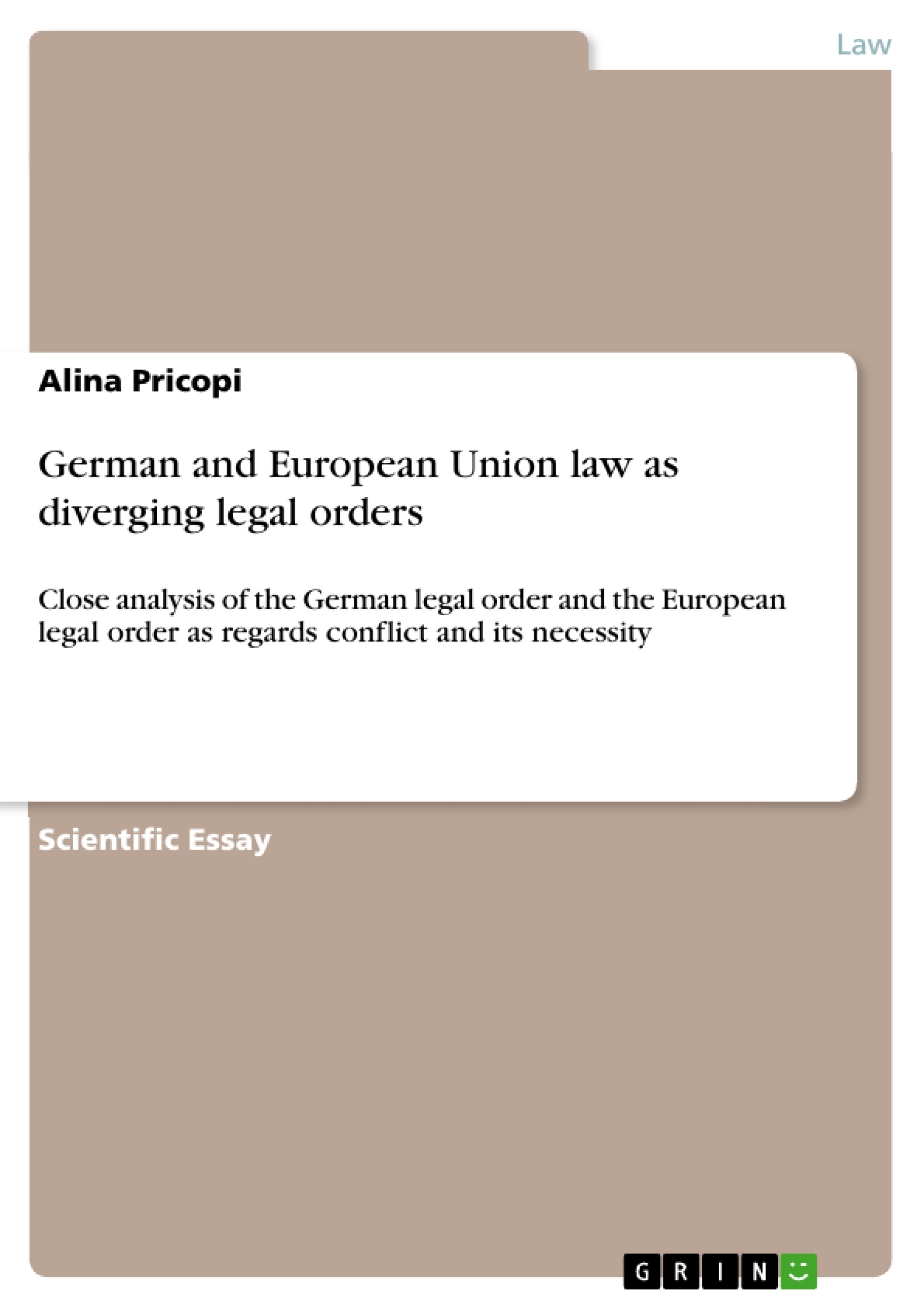Within the European Union, the Court of Justice (hereinafter the Court) developed through its case law the doctrine of supremacy. The outcome has been the creation of a new legal order which now exists independently of the separate legal orders of the Member States. Since both the legal order of the European Union and the one of the Federal Republic of Germany assume the role of higher law, as such there is a conflict between the two. The claim of the current paper is that such a conflict creates a necessary balance and that by its existence it does not erode the acquis communautaire of the European Union. Moreover, the present paper concurs with the German approach as to rejecting the supremacy of EU law over German national law.
In order to support the above-mentioned claim, the aim of the paper will consist of the following steps. First, the conflict between the two legal orders will be shortly illustrated. Second, the reasoning of the Supreme Constitutional German Court or the Bundesverfassungsgericht (hereinafter the Bundesverfassungsgericht) will be presented with the help of landmark national cases and also the principles of militant democracy and eternity clause. Third, an analysis of whether the conflict is necessary and whether it creates a balance within a pluralist dimension will be offered.
The reason why this topic has been chosen is to show how two legal orders coexist while having created a conflict through the imposition of certain limits. The limits were imposed through the national case law of the Bundesverfassungsgericht.
The methodology employed by the paper will be the doctrinal research. In the selection of appropriate sources, the focus will be on primary and secondary sources of law e.g. case law of the Court, national case law of the Bundesverfassungsgericht, books, articles and papers that will illustrate the aim of the paper.
Inhaltsverzeichnis (Table of Contents)
- Introduction
- The existence of a conflict between the two legal orders
- Different definitions of the doctrine of supremacy
- Judicial control
- Analysis
- Conclusion
Zielsetzung und Themenschwerpunkte (Objectives and Key Themes)
The aim of this paper is to analyze the conflict between the legal orders of the European Union and the Federal Republic of Germany, particularly in the context of the doctrine of supremacy. The paper argues that this conflict is necessary for achieving a balance between the two legal orders and that it does not erode the acquis communautaire of the European Union.
- The doctrine of supremacy of EU law
- The conflict between EU law and national law
- The role of the Bundesverfassungsgericht
- The principles of militant democracy and the eternity clause
- The concept of ultra vires review
Zusammenfassung der Kapitel (Chapter Summaries)
- Introduction: This chapter introduces the topic of the conflict between the European Union and the German legal orders, highlighting the doctrine of supremacy and its implications for both legal systems.
- The existence of a conflict between the two legal orders: This chapter examines the overlapping boundaries between the two legal orders, focusing on the different interpretations of the doctrine of supremacy by the Court of Justice and the Bundesverfassungsgericht. It analyzes landmark national cases like the Maastricht Urteil and the Lisbon Urteil, showcasing the limits imposed by the Bundesverfassungsgericht.
- Analysis: This chapter delves into the Bundesverfassungsgericht's rejection of the doctrine of supremacy and its imposition of limits related to fundamental rights, competence, and constitutional identity. It discusses the Honeywell case, which represents a shift in the Bundesverfassungsgericht's approach towards ultra vires review and outlines the requirements for invoking this review.
Schlüsselwörter (Keywords)
The key terms and concepts discussed in this paper include: doctrine of supremacy, conflict of legal orders, Bundesverfassungsgericht, militant democracy, eternity clause, ultra vires review, acquis communautaire, and legal pluralism.
Frequently Asked Questions
What is the "doctrine of supremacy" in EU law?
The doctrine of supremacy establishes that European Union law takes precedence over the national laws of its Member States in case of conflict.
How does the German Constitutional Court (BVerfG) view EU supremacy?
The BVerfG rejects the absolute supremacy of EU law, maintaining that it must respect the German Constitution's fundamental rights and core identity.
What is the "eternity clause" (Ewigkeitsklausel)?
It is Article 79(3) of the German Basic Law, which prohibits any constitutional amendments that affect the core principles of democracy, human dignity, and the federal structure.
What does "ultra vires review" mean?
It is a legal review by national courts to check if EU institutions have exceeded the specific powers granted to them by the member states in the treaties.
Why is the conflict between EU and German law considered "necessary" in the paper?
The paper argues that the friction creates a balance that protects national constitutional identity while allowing for legal pluralism within the European Union.
- Quote paper
- Alina Pricopi (Author), 2017, German and European Union law as diverging legal orders, Munich, GRIN Verlag, https://www.grin.com/document/354042



